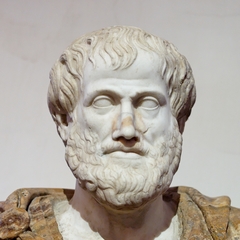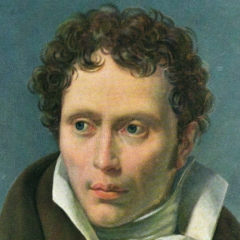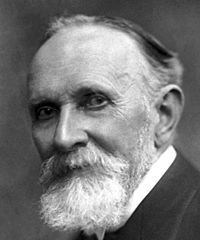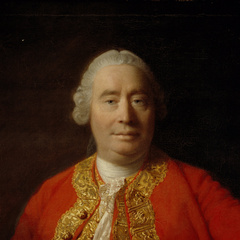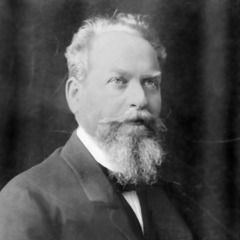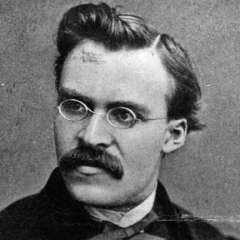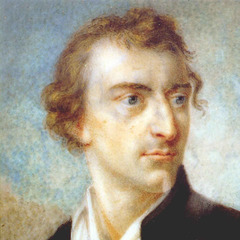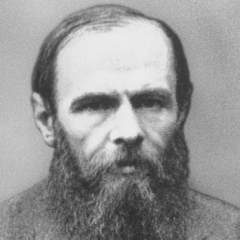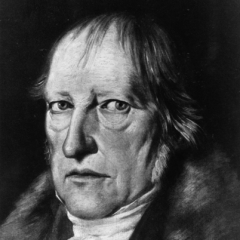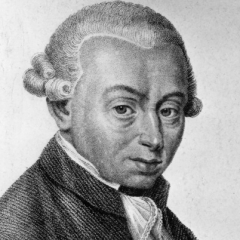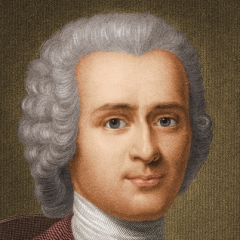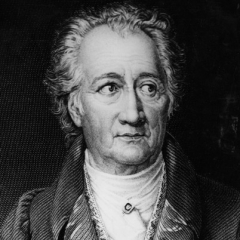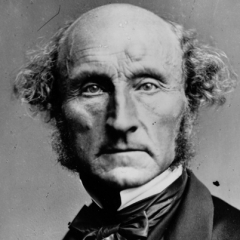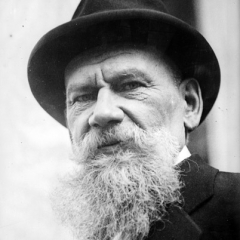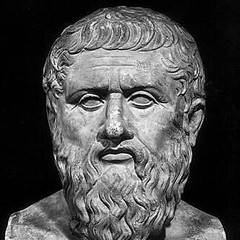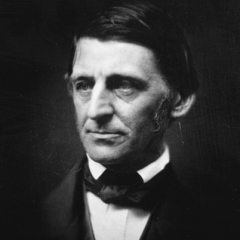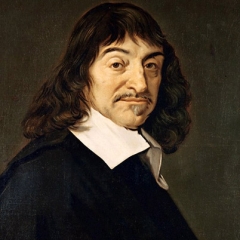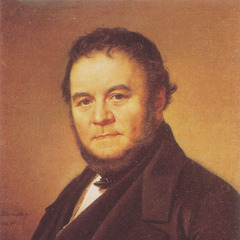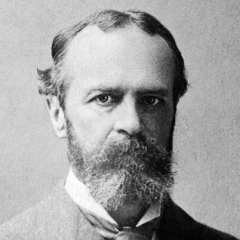African Spir quotes
-
“Up to here, in general, we have mainly stuffed the brain of the young people with a indigestible multitude of varios notions, without thinking about enough of the prime necessity to form their character.”
-- African SpirSource : "Words of a Sage : Selected thoughts of African Spir". Book by Hélène Claparède-Spir, p.58, 1937.
-
“The distinction between right and wrong ("la distinction du bien et du mal", Fr.), is nothing else than their unyielding (or implacable) opposition; thus the moral consciousness is an innate and intimate revelation of the absolute, which goes beyond (or goes pass, or exceed) every empirical data (or given information). It is only on these principles that we will be able to establish ("pourront être édifiées", Fr.) the real basis of morality.”
-- African SpirSource : "Paroles d'un sage: Choix de pensées d'African Spir" ("Words of a Sage : Selected thoughts of African Spir") by Hélène Claparède-Spir, (p. 60), 1937.
-
“Possessions of this world have not been for the exclusive use by such or such category of individuals.”
-- African SpirSource : "Paroles d'un sage: Choix de pensées d'African Spir" ("Words of a Sage : Selected thoughts of African Spir") by Hélène Claparède-Spir, (p. 52), 1937.
-
“The more gifted by nature is a man, the more is deplorable the abuse that he does by using them to shameful ends. A swindler (or crook) of higher condition is more blameworthy than a vulgar scoundrel; an intelligent eveil-doer, having benefited from a higher education, represent a more saddening phenomenon ("phénomène", Fr.) than an unfortune illiterate fellow having commited an offence.”
-- African SpirSource : "Paroles d'un sage: Choix de pensées d'African Spir" ("Words of a Sage : Selected thoughts of African Spir") by Hélène Claparède-Spir, (p. 48), 1937.
-
-
“Whoever has recognized the vainglory of individuality will not attach any store ("n'attachera aucun prix à ", Fr.) to fame. The only one thing which is really valuable, it is to do good.”
-- African Spir -
“In the actual state of social relationships, the forms ("formes", Fr.) of politeness are necessary as a subsitute to benevolence.”
-- African SpirSource : "Paroles d'un sage: Choix de pensées d'African Spir" ("Words of a Sage : Selected thoughts of African Spir") by Hélène Claparède-Spir, (p. 50), 1937.
-
“If the present civilisation does not acquire some stable moral fondations ("bases morales stables", Fr.), its existence will hardly be more assured than that of the civilisations that have preceeded it, and which have fallen (or collapse, or failed”
-- African Spir -
“In ancient times, any man rising up above the common people tried to shape his life according to his principles; it is no longer like than now; it is (because) for the ancients, moral was a principle of inner life, whereas in our days, most of the time one is content to adhere to an official moral, that we recognize in theory, but that one does not care to put into practice.”
-- African Spir -
-
“The antagonism between nationalities will lose all its acuteness on the day when neither the iniquitous tendency to oppression and domination, nor the perpetual danger of the threatening preparations for war will exist. ("L'antagonisme entre les nationalités perdra toute son acuité le jour où n'existera plus la tendance inique à l'oppression et à la domination, ni le perpétuel danger des menaçants préparatifs de guerre.:;», Fr.”
-- African Spir -
“Men who have sacrifice their well-being, and even their lives, for the cause of truth or the public good, are, from an empirical point of view - which scorn ("fait fi", Fr.) virtue and altruism - regarded as insane or fools; but, from a moral standpoint, they are heros who do honour ("qui honorent", Fr.) humanity.”
-- African SpirSource : "Paroles d'un sage: Choix de pensées d'African Spir" ("Words of a Sage : Selected thoughts of African Spir") by Hélène Claparède-Spir, (p. 38), 1937.
-
“Nothing is more stimulating and more salutary to (or for) the inner (or inward) development than the exemple of men devoted to the good. It is in the company of men pursuing a same ideal that the still weavering (or unsteady) soul can set oneself ("se fixer", Fr) and stick to (or attach to) everything that is noble and generous.”
-- African SpirSource : "Paroles d'un sage: Choix de pensées d'African Spir" ("Words of a Sage : Selected thoughts of African Spir") by Hélène Claparède-Spir, (p. 58), 1937.
-
“In this world everything that is won to the ideal, is an eternal (or imperishable, - "impérissable", Fr.) good.”
-- African Spir -
-
“If pity was always equally alive and acting in all individuals and in all circumstances, we could do away with moral. Unfortunately, it is not compassion, but rather it's contrary, selfishness, that act most strongly in us.”
-- African SpirSource : "Paroles d'un sage: Choix de pensées d'African Spir" ("Words of a Sage : Selected thoughts of African Spir") by Hélène Claparède-Spir, (p. 57), 1937.
-
“The first principle from which stems the moral of about all people at all time; it is summarized in this precept: Love thy neighbour as thyself, and: do as you would be done by.”
-- African SpirSource : "Paroles d'un sage: Choix de pensées d'African Spir" ("Words of a Sage : Selected thoughts of African Spir") by Hélène Claparède-Spir, (p. 38), 1937.
-
“Deep down, everything boils down ("au fond tout se ramène", Fr.) to the following simple question; Do we really want justice and the realization in this world of higher principles, or else do we want to serve selfish, short-sighted (à courte vue", Fr.) interests, which, when all is said and done, are also prejudicial (or detrimental, or harmful) to those very same that pursue them?”
-- African Spir -
“The realization of justice is, in the actual state of things, a matter of life or death for society and for civilisation itself.”
-- African Spir -
-
“There is a radical dualism between the empirical nature of man and its moral nature.”
-- African SpirSource : "Paroles d'un sage: Choix de pensées d'African Spir" ("Words of a Sage : Selected thoughts of African Spir") by Hélène Claparède-Spir, (p. 59), 1937.
-
“Arbitrariness and true liberty are as distinct from each other that the empirical nature is distinct from the higher nature of man.”
-- African Spir -
“See that unfortunate soldier who is falling hurt to death ("tombe blessé à ...", Fr.) on the battlefield; he learns that his folks have vanquished and dies happy. He detached himself from himself (s'est détacher de lui-même", Fr.), has identified himself with something greater and more lasting than himself; his homeland ("patrie", Fr.); thus, while dying as an individual, he has the certainty to survive in a larger existence.”
-- African Spir -
“Only a moral education based on free inner discipline can bring to bear a salutary action and lead to a true morality.”
-- African SpirSource : "Words of a Sage : Selected thoughts of African Spir". Book by Hélène Claparède-Spir, p. 59, 1937.
-
-
“It goes without saying that only inner greatness possess a true value ("une valeur véritable,", Fr.) . Any attempt to rise up (or at rising up, - "s'élever", Fr.) outwardly above others, or to want (or wish) to impose one's superiority, denote a lack of moral greatness, since we do not try to replace ("suppléer", Fr.) in that way (.... in French "par là ", Fr.) to what, if we did really possess it, would have no need whatsoever to flaunt itself.”
-- African Spir -
“There is only one thing in the world that is really valuable, it is to do good.”
-- African SpirSource : "Words of a Sage: Selected thoughts of African Spir". Book by African Spir, p. 56, 1973.
-
“It is to our lack of proper content ("notre manque de contenu propre:;», Fr.), of our inner emptiness that we need occupations and distractions, otherwise ("faute de quoi", Fr.) we experience boredom, which is nothing elses than the feeling of unease that take hold of us when our spirit is not absorbed by the mirages of life.”
-- African Spir -
“It must be all the same to the citizens ("ressortissants", Fr.) of a country that their governing (those in power) speak such language or such other ("telle langue ou telle autre", Fr.); likewise that it must be all the same to them that these adhere to such or such religion, so long as a full (or complete) liberty is equally garantee for everyone.”
-- African Spir -
-
“The intellectual development of man, far from having get men away from war, has, rather, on the contrary, bring them to a refinment always more perfected in the art of killing. They even came to raise the methods of slaughter to the rank of "science"... We would not (On ne saurait", Fr.) imagine a more extraordinary moral blindness!”
-- African SpirSource : "Paroles d'un sage: Choix de pensées d'African Spir" ("Words of a Sage : Selected thoughts of African Spir") by Hélène Claparède-Spir, (p. 55), 1937.
-
“The most sacred duty, the supreme and urgent work, is to deliver humanity from the malediction of Cain - fratricidal war.”
-- African Spir -
“As long as men will not be freed from their errors and delusions, humanity will not be able to go towards ("marcher vers", Fr.) the accomplishment of its true destinies.”
-- African SpirSource : "Paroles d'un sage: Choix de pensées d'African Spir" ("Words of a Sage : Selected thoughts of African Spir") by Hélène Claparède-Spir, (p. 60), 1937.
-
“The well understood equity as well as interest of society demand that we work on much more to prevent crime and offenses than to punish them.”
-- African SpirSource : "Paroles d'un sage: Choix de pensées d'African Spir" ("Words of a Sage : Selected thoughts of African Spir") by Hélène Claparède-Spir, (p. 52), 1937.
-
-
“Apart from selfish reasons, such as fear of punishments, fear of blame, of dishonour, etc, there remains only two motives that can stop (or prevent, "empâecher", Fr.) men from acting badly; the natural sense of commiseration (or "sympathy", - "commisération", Fr.) for one's fellow men - compassion, and the influence of education, by association of ideas ("par l'association d'idées", Fr.) - habit.”
-- African Spir -
“To be effective, morality has to be reasoned (or worked out). To want ("vouloir", Fr.) to repress evil only by coercion, and to obtain morality by a sort of training with the help of constraint, without motivating it from within, is to make it an unnatural result, devoided of lastind value.”
-- African SpirSource : "Paroles d'un sage: Choix de pensées d'African Spir" ("Words of a Sage : Selected thoughts of African Spir") by Hélène Claparède-Spir, (p. 59), 1937.
-
“It is not on the ruin of liberty that we may (in the future... - "pourra", Fr.) build justice.”
-- African SpirSource : "Paroles d'un sage: Choix de pensées d'African Spir" ("Words of a Sage : Selected thoughts of African Spir") by Hélène Claparède-Spir, (p. 46), 1937.
-
“Men spend their life down here in the worship of petty (or mean) interests and the search of perishable things, and with that ("et avec cela", Fr.) they pretend to perpetuate for all eternity their self ("moi", Fr.) so hardly worthy ("digne", Fr.) of it.”
-- African SpirSource : "Paroles d'un sage: Choix de pensées d'African Spir" ("Words of a Sage : Selected thoughts of African Spir") by Hélène Claparède-Spir, (p. 51), 1937.
-
-
“To sacrifice the moral to the physical, as is done in these days, is to sacrifice reality for a shadow.”
-- African Spir -
“To reform society, and with it humanity, there is only one mean; to transform the mentality of men, to direct them ("les orienter", Fr.) in a new spirit.”
-- African Spir -
“There are some who esteem that it is a naivety to believe that a moral regeneration may be possible ("soit possible", Fr.); now, if this was not the case, it would not be worth the trouble that humanity continue to vegetate without aim.”
-- African Spir -
“It depends on ourselves to be to each others, either a blessing or a torment.”
-- African Spir -
-
“Infringing upon (or encroaching) the right of a single person, we overthrow (or turn upside down) the whole order on which rest legal agreements; for if we break (or transgress or violate) the undertakings enter unto ("les engagements contractés", Fr.), nothing assure that we will not break them, possibly ("éventuellement", Fr.) in another.”
-- African Spir -
“The fact that men have a same origin and live in the same universe means that they are representatives of a same unity. Deep down, they are also related (or connected) among them; that they consider (or not) themselves as strangers, this just depends on the feeling (or sensation) that dictate their relationships. In their country, two fellow coutrymen whose paths berely cross (or see each only only briefly) with inferrence, would effusively rush themselves up (or throw themselves) into each other arms if they would happen to meet in a desert, among Cannibles.”
-- African SpirSource : "Paroles d'un sage: Choix de pensées d'African Spir" ("Words of a Sage : Selected thoughts of African Spir") by Hélène Claparède-Spir, (p. 42), 1937.
-
“The basic notion of justice, is that the rights of everybody are equals, in principle. In the rights of others, we have to respect our own rights. It is only in that condition that we can reasonnably require that it be respected by others.”
-- African Spir -
“A man, engaged in his simple reflections in everyday life, will comprehend neither the possibility, nor the benefits of self-sacrifice, but, when given ("qu'on lui donne", Fr.) a great cause to defend, and he will find only natural to sacrifice oneself for it.”
-- African Spir -
-
“Education has a tremendous power on man. Can't we see to which astonishing disciple the people of Sparte have submitted ("s'est plié", Fr.) for centuries, and this with a view to very petty purposes: purely outer greatness, the military predominace of Sparte. This example proves that man can everything on themselves when they want it ("peuvent tout sur eux-mêmes quand ils le veulent", Fr.); therefore it would only be a question of making them will the good.”
-- African Spir -
“Man is in pursuit of two goals: he is looking for happinesse and, being by essence empty ("étant vide par essence", Fr.), he is trying to fill (or take up, - "remplir", Fr.) his life; the latter reason play a more considerable role than we ordinarily think. What we take for vainglory, ambition, love of power and riches (or wealth), is often, indeed, a need to mask this emptiness, a need to let one's hair down (or to live it up), to put oneself on a false scent or trail. (de se donner le change", Fr.”
-- African SpirSource : "Paroles d'un sage: Choix de pensées d'African Spir" ("Words of a Sage : Selected thoughts of African Spir") by Hélène Claparède-Spir, (p. 56), 1937.
-
“The appalling and shameful scene ("spectacle", Fr.) of disarray and illogicality that manifest itself in the thought and deeds of men, will no longer be seen, once these will possess an enlighten consciouness.”
-- African SpirSource : "Paroles d'un sage: Choix de pensées d'African Spir" ("Words of a Sage : Selected thoughts of African Spir") by Hélène Claparède-Spir, (p. 61), 1937.
-
“Nothing that rest on some contradictory basis shall succeed or last in the long run ("ne saurait réussir ou durer, à la longue", Fr.); all that involve (or imply...) a contradiction is fatally destined, early or late, to disintegrate and disappear.”
-- African Spir -
-
“A good man ("un homme de bien", Fr.) never wholly perishes, the best part of his being outlives (or survives) in eternity.”
-- African Spir -
“What is the use for a man to have at his disposal a large field of action, if within himself he remains confine to the narrow limits of his individuality.”
-- African Spir -
“In life we only try to produce, to win, and enjoy the more we can; in science, to discoverand invent the more we can; in religion, to dominate (or rule over) on the greatest number of people we can; whereas the forming of the character, the further development (or in-dept analysis, "appronfondissement", Fr.) of the faculties of the intelligence ("les facultés de l'intelligence", Fr.), the refinement of the consciousness and of the heart, are considered incidental (or subordinate) things.”
-- African Spir -
“Place (or put) a spider on top of a mountain, it will only try to catch flies; alas, they are many those who, in the figurative meaning, have spider's eyes.”
-- African Spir -
-
“The moral improvement demands an evolution leading to a higher consciousness”
-- African Spir -
“If man do not find in himself the required (or wished, or wanted, - "voulue", Fr.) force to accomplish his moral aspirations, he can try to purt himself in the conditions suitable to assist (or promote, or further, -"favoriser", Fr.) his self-control.”
-- African Spir -
“Besides the progress of industry and technique, we see a growing discontent among the masses; we see, besides the expansion ("expansion,", Fr.) of instruction, distrust and hatred expanding among nations ("s'étendre la méfiance et la haine entre," Fr.), that vie with one another ("qui rivalisent à l'envi," Fr.), by the increase of their armies and the improvement of their engines of murder ("engins meurtriers", Fr.).”
-- African Spir -
“The feeling ("sens", Fr.) of solidarity that is born amidst a community rest on the feeling of antagonism arouse (aroused:;? arose:;?... sorry, - "suscité", Fr.) by those who are opposed to it. Most of the time we only adhere to a party or a group, in order to better (or more, - "pour mieux se", Fr.) differentiate ourselves of another.”
-- African Spir -
-
“Experience shows that what great role pratice and experience play in education; pratice, the prolonged exercice lead to habit: exemple suggests imitation. Habit can become a second nature, but, wrongly directed (or guided), it may also heighten (or intensify) unfortunate tendencies and be an obstacle to progress.”
-- African Spir -
“The need for sociability induce man to be in touch with his fellow men. However, this need might not ("ne saurait", Fr.) find its full (or complete) satisfaction in the conventional (or superficial, - "conventionnel", Fr.) and deceitful world, in which (or where) everyone is mainly (or mostly) trying to assert oneself in front of others ("devant les autres", Fr.), to appear, and hoping to find in society ("mondaine", Fr.) relationships some advantages for his interest and vanity (or vainglory or conceit", Fr.).”
-- African Spir -
“Outward, thanks to the knowledge of physical laws, man could subdue (or subjugate...) nature, but inwardly, he remained a slave to it. For, when all is said and done, at what is aiming all this display (or deployment) of activity, if not to realized outward profits, to provide material pleasure (or enjoyment). It is not the first time that men sell their birth right for a dish of lentils, and thus disown (or repudiate or deny) the best of thmeselves.”
-- African Spir -
“When under the influence of certain (or some) reasons (or causes) (alcohol, war, etc - added Spir here) the low instincts are unbridled (or unrestrained), the brute appears (or come forward, "apparait", Fr.) and rule over (or dominate), stifling every ("toute", Fr.) noble, generous impulse; it is then the ruin (or downfall or decline) of any humanity in man.”
-- African Spir -
-
“The more a man is successful in getting out (or coming out) from his own individuality, of his egoist self, and to control (or dominate) the instincts of his physical nature, the more his character, by rising above material contingencies, widen, become free and independent.”
-- African Spir -
“There are (or is) indeed no contradiction between science and religion, the fields of which are different, and which, far from mutually fighting and persecute, must, on the contrary, complete each other.”
-- African Spir -
“The divine element manifests itself (or show up) in man as well by his aptitude for science, than by his aptitude for virtue. True morality, true philosophy and true art are in their essence ("dans leur essence", Fr.) religious.”
-- African Spir -
“The concept of absolute, hence (or whence) springs, in the moral field, the moral laws or norms, represent, in the field of knowledge, the principle of identity, which is the fundamental law of the thought; norms of logic springs from it, that govern the thought (or mind) in the field of science." ("Le concept de l'absolu, d'où découlent, dans le domaine moral, les lois ou normes morales, constitue, le principe d'identité, qui est la loi fondamentale de la pensée; il en découle les normes logiques qui régissent la pensée dans le domaine de la science.”
-- African SpirSource : "Paroles d'un sage: Choix de pensées d'African Spir" ("Words of a Sage : Selected thoughts of African Spir") by Hélène Claparède-Spir, (p. 59), 1937.
-
-
“The precept to worship God 'in spirit and in truth' recommand to worship him as an inward and moral force, without physical attributes and with no relation to fears and egoist wishes.”
-- African Spir -
“Religion is not simply a theory, it is a higher life, of which morality is an integral part - a life devoted to the worship of the good and the true, for God, the absolute, is the supreme source of all perfection" ("La religion n'et pas une smple théorie, elle est une vie supérieure, dont la moralité fait partie intégrante - une vie vouée au culte du bien et du vrai, car Dieu, l'absolu est la source de toute perfection", Fr.”
-- African Spir -
“As the antagonism between those who possess, and those who do not, is becoming more acute day after day, we can already foresee a moment when it will bring about ("entraînera", Fr.) severe (big, high, intense, - "grands", Fr.) disasters, if we do turn (direct, aim, - "dirige", Fr.) life in time the social life in new directions (or ways, - "dans des voies nouvelles", Fr.”
-- African Spir -
“Whether we had a (good) moral intuition more developed, we would be as much morally disgusted by the rapacity of those who try to benefit from, and monopolize (or secure or corner), having no consideration (regardless or irrespective of) for others ("autrui", Fr.), than we physically are by a sickening (or nauseating) smell.”
-- African SpirSource : "Paroles d'un sage: Choix de pensées d'African Spir" ("Words of a Sage : Selected thoughts of African Spir") by Hélène Claparède-Spir, (p. 43), 1937.
-
-
“The supreme blossoming of character lies (or reside) in renounciation (or renuncement) and abnegation of self ("abnégation de soi", Fr.”
-- African Spir -
“Moral improvement (or perfecting) require an evolution leading to a higher consciousness, which is the true torch of life; it is what we have failed too much to appreciate, and that which would be fatal to fail to appreciate any longer ("pluslongtemps", Fr.); For if we do not take it upon ourselves to remedy in time to the moral colapse (or bankruptcy) that already threaten, the whole civilisation will risks to disappear.”
-- African Spir -
“So many forces and resources would become available if States, aware (or conscious) of their true (or real) mission, would want to get on (or agree) to abolish every politics aiming at ("visant à ", Fr.) expansion or hegemony; system that maintain among nations a a perpetual distrust and tension, impose on them (or force or compel, "leur impose", Fr.) formidable armies and crushing war budgets.”
-- African Spir -
“We can, following the exemple of Kant, consider the moral development and improvement of men, as the supreme goal of human evolution.”
-- African SpirSource : "Paroles d'un sage: Choix de pensées d'African Spir" ("Words of a Sage : Selected thoughts of African Spir") by Hélène Claparède-Spir, (p. 61), 1937.
-
You may also like:
-
Aristotle
Philosopher -
Arthur Schopenhauer
Philosopher -
Blaise Pascal
Mathematician -
Carl Spitteler
Poet -
David Hume
Philosopher -
Edmund Husserl
Philosopher -
Friedrich Nietzsche
Philologist -
Friedrich Schiller
Poet -
Fyodor Dostoevsky
Novelist -
Georg Wilhelm Friedrich Hegel
Philosopher -
Immanuel Kant
Philosopher -
Jean-Jacques Rousseau
Philosopher -
Johann Wolfgang von Goethe
Writer -
John Stuart Mill
Philosopher -
Leo Tolstoy
Writer -
Plato
Philosopher -
Ralph Waldo Emerson
Essayist -
Rene Descartes
Philosopher -
Stendhal
Writer -
William James
Philosopher
